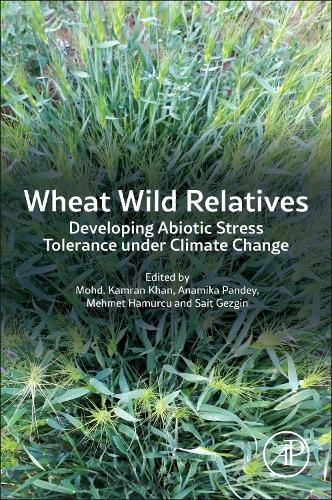Readings Newsletter
Become a Readings Member to make your shopping experience even easier.
Sign in or sign up for free!
You’re not far away from qualifying for FREE standard shipping within Australia
You’ve qualified for FREE standard shipping within Australia
The cart is loading…






Wheat Wild Relatives: Developing Abiotic Stress Tolerance under Climate Change presents a state-of-the-art outline of the problem, including issues, opportunities, and modern developments in the utilization of Wild Wheat Relatives (WWR) and related neglected species for wheat crop improvement, specifically focusing on environmental constraints. The book comprehensively discusses different wheat wild relatives, including major genus Triticum and Aegilops and their utilization in mitigating different environmental constraints using agronomic, physiological, and molecular approaches. Chapters provide insights into the advancement in the deployment of wheat genetic resources, including wild relatives and neglected species for crop improvement towards environmental issues.
Wheat is a major staple food crop that has largely been focused for fulfilling the food requirements of world population during the Green revolution. Since then, it has come to cover more agricultural land than any other commercial crop. Continuously changing climatic conditions have drastically affected wheat production, with yields largely limited by environmental constraints. Theses production losses caused by crop vulnerability to climate change may be resolved by using wheat wild relatives that are closely related to cultivated genotypes and known for their beneficial traits.
$9.00 standard shipping within Australia
FREE standard shipping within Australia for orders over $100.00
Express & International shipping calculated at checkout
Stock availability can be subject to change without notice. We recommend calling the shop or contacting our online team to check availability of low stock items. Please see our Shopping Online page for more details.
Wheat Wild Relatives: Developing Abiotic Stress Tolerance under Climate Change presents a state-of-the-art outline of the problem, including issues, opportunities, and modern developments in the utilization of Wild Wheat Relatives (WWR) and related neglected species for wheat crop improvement, specifically focusing on environmental constraints. The book comprehensively discusses different wheat wild relatives, including major genus Triticum and Aegilops and their utilization in mitigating different environmental constraints using agronomic, physiological, and molecular approaches. Chapters provide insights into the advancement in the deployment of wheat genetic resources, including wild relatives and neglected species for crop improvement towards environmental issues.
Wheat is a major staple food crop that has largely been focused for fulfilling the food requirements of world population during the Green revolution. Since then, it has come to cover more agricultural land than any other commercial crop. Continuously changing climatic conditions have drastically affected wheat production, with yields largely limited by environmental constraints. Theses production losses caused by crop vulnerability to climate change may be resolved by using wheat wild relatives that are closely related to cultivated genotypes and known for their beneficial traits.